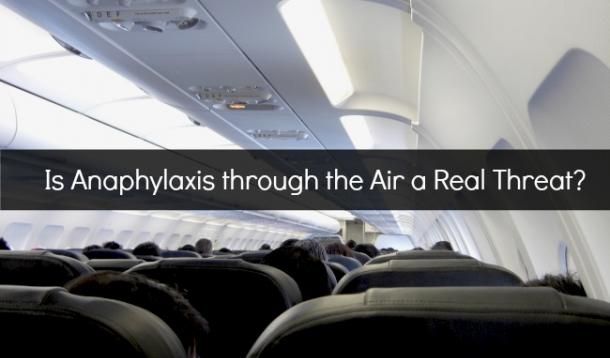
I rely on Allergic Living to give me straight answers to the questions we in the allergy community ask. They're full of great information and articles, and I really enjoy following them on Twitter and Facebook, too. What I most appreciate is that when there are hot news items, like the recent case of a little girl nearly dying on board a flight due to an anaphylactic reaction, Allergic Living speaks up and finds out the facts to share with their audience.
So what about those two recent cases of anaphylaxis on airplanes? It's absolutely terrifying to think that this could happen to anyone. How can I ever take my son on an airplane if allergens can travel through the air and into him, no matter how we try to protect him? In fact, how can I really take him anywhere knowing this is a possibility? Immediately following the stories, I was bombarded with people sending me the link and saying, "See? SEE!?" because I've always maintained that no studies I've ever heard of can prove that airborne allergens like these are a real threat.
Allergic Living went straight to an allergist and asked the questions we all want the answers to. Patrick Bennett interviewed Dr. Matthew Greenhawt, who is an expert on airlines and allergies and I encourage you all to read the piece. And I want you all to share that piece the way you all shared the two news articles they're referencing. Because it is THIS information we need to circulate to temper the other. It is this rational approach we need, and this education we all need to have.
Some of the most important points I took from the article are these:
"Close range (12 inches) exposure to inhaling peanut butter resulted in no reaction in severely reactive peanut allergic subjects."
This means that no, smelling the allergen cannot cause anaphylaxis.
"Peanut butter and peanut dust are both easily cleaned from hands and surfaces using a variety of commercially available cleaners."
This means it's totally safe to just wipe down an area of concern and have it be safe for an allergic person.
"...there are no active proteins involved in breathing in the aroma of re-heated, pre-roasted nuts."
This means that on board a plane, the smell of nuts being warmed (does this happen?) is no threat.
Apparently, surface contamination is a bigger concern than inhalation since airplanes are required to circulate air through HEPA filters. So what really happened in these two recent cases? Dr. Greenhawt theorizes that surface contamination may have been the culprit and not inhalation at all. Yet, despite what all the studies have shown, Dr. Greenhawt also noted that people will still "assume or report that their child has had an airborne reaction, in spite of the available evidence that this is highly unlikely to occur."
When I read the articles and posted about them, out of the woodwork came so many stories about:
"This happened to my sister!"
"I knew a person who died from this!"
"My daughter could DIE if you eat peanuts in the same room."
What is it that makes us pass along these stories without any real proof? Is it the fear factor? I don't know, but I'm glad that the reality is that it's really NOT that big a threat.
Please share the Allergic Living article. Advocating for allergy education isn't the same as scaring the everliving crap out of people for no decent reason.
Why is it important we all learn about allergies even if we aren't affected by them?
Awesome News For Allergic Travellers! SWISS Air is aiming to take the stress of travel out of the equation for those with allergies, whether food or environmental.